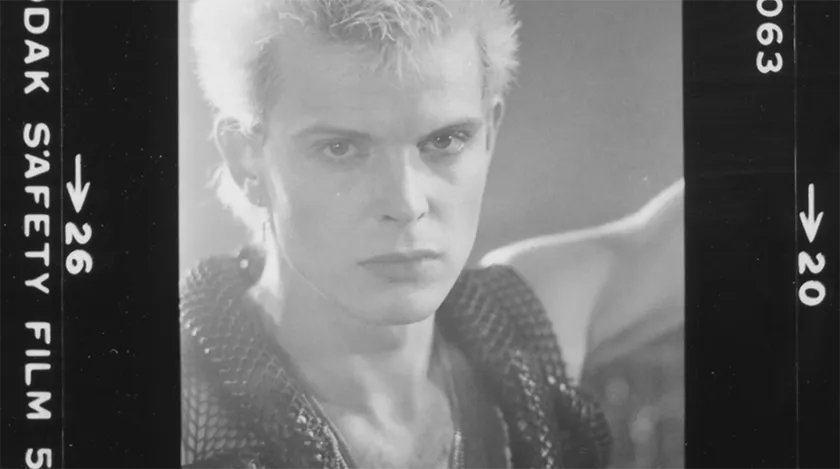Billy Idol Should Be Dead offers a detailed look at the singer’s rise to fame and why he remains an icon in the punk rock scene.
Director: Jonas Åkerlund
Genre: Documentary, Music
Run Time: 118′
Tribeca Screening: June 10, 2025
U.S. Release Date: TBA
U.K. Release Date: TBA
If the title of Jonas Åkerlund’s new musical documentary isn’t startling enough, then the revelations of the punk rocker it’s based on certainly are. In Billy Idol Should Be Dead, the director wastes no time jumping straight into the chaos of the singer’s hectic life, which has been nothing short of a rollercoaster.
In the opening scene of the documentary, we see Idol in the recording studio working on a song. After he discusses an overdose in 1984 that almost ended his life, viewers are left wondering what led to such a low point. Eventually, we get answers to those burning questions, though not before taking a trip down memory lane, detailing his journey to stardom.
Although the successful singer is known for mega-hits such as “White Wedding,” “Rebel Yell,” “Eyes Without a Face,” and “Dancing With Myself,” before his solo career, he was part of the punk rock band Generation X. In a series of sit-down interviews about his time in the group, Idol discusses the challenges that came with being from a middle-class family. At the time, the UK was experiencing an economic crisis, resulting in rising unemployment. As many punk rockers came from working-class families, Idol recounts not exactly fitting into the usual mold.
After being invited to perform on Marc Bolan’s musical show Marc, the band gained more visibility and popularity. While the group had a great run, by the early 80s, two members of the band had left to pursue other projects, and in 1981, Idol ventured stateside to pursue his solo career.

What stands out about Billy Idol Should Be Dead is just how informative the documentary is. The film clocks in at just under two hours, which gives us plenty of time to take an extensive, closer look at Idol’s incredibly successful career. You can tell how much his friends and other singers in the industry respect and love his music. The film features many other well-known recording artists who admire Billy Idol’s work, with Miley Cyrus and Billie Joe Armstrong even making appearances. The archive footage will also evoke great nostalgia for those who grew up listening to his music and for those who still reminisce about shows like MTV, feeling a twinge of sadness whenever they see the iconic logo.
Idol is also an extremely likable person who doesn’t hold back when delving into the darkest moments of his life, sharing some very personal experiences that must have been hard to revisit. He also has a wonderful sense of humor, which shines through in his storytelling, and his humble persona makes you forget that he’s such a big rockstar. The singer shares his struggles openly, takes responsibility for his mistakes, and acknowledges his flaws.
That said, one of the most significant drawbacks of Billy Idol Should Be Dead is its pacing, which feels too hurried through certain moments. As someone who likes Idol’s music but knew little about his backstory, I was keen to learn more about the star. However, just as I was starting to engage with a particular moment of his life and settle into the narrative, the documentary would transition to a different time period. The time jumps in this nonlinear documentary felt a bit too jarring and pulled me out of the film emotionally.
There are also some points in the narrative when serious subject matter, such as when Idol being high on drugs, is depicted via animation. While this choice is certainly a captivating, bold, and stylistic choice, reflecting his state of mind during times of substance abuse, I couldn’t help but feel that this surreal tone clashed with the heavy topics being discussed during those moments.

Despite some setbacks, there’s still a lot to love about Billy Idol Should Be Dead. It provides viewers with a thorough exploration of the punk rocker’s life, equipped with archive footage, detailed accounts of his family life, and his joys of being a father. These sentimental moments compensate for the areas of the documentary where the narrative loses emotional momentum or when it feels somewhat disjointed.
Whether you are entering this documentary as a lifelong fan or you’re watching Billy Idol Should Be Dead as a casual listener of his most recognizable songs, you’ll be sure to leave the viewing experience knowing all there is to know about this singer and why the spikey haired, leather wearing icon is as loved as he is.
Billy Idol Should Be Dead: Movie Plot & Recap
Synopsis:
Billy Idol Should Be Dead provides a detailed examination of the punk rocker’s rise to fame and the struggles he faced throughout his successful career.
Pros:
- It features extensive archive footage that fans are sure to appreciate.
- Idol is a likable and engaging storyteller, and his sense of humor shines through as he reflects on his past.
- The documentary is exceptionally detailed and provides all the necessary information about his rise to fame.
- The moments when he speaks about his family and being a father are wholesome and a joy to watch.
Cons:
- The time jumps throughout the documentary, and moments of fast-paced storytelling make the film feel disjointed at times.
- Though creative, using animations to depict the darker moments of the singer’s life took me out of the narrative emotionally.
Billy Idol Should Be Dead had its World Premiere at the Tribeca Film Festival on June 10-14, 2025. In the U.K., the film will be screened at Sheffield DocFest on June 20, 2025.

